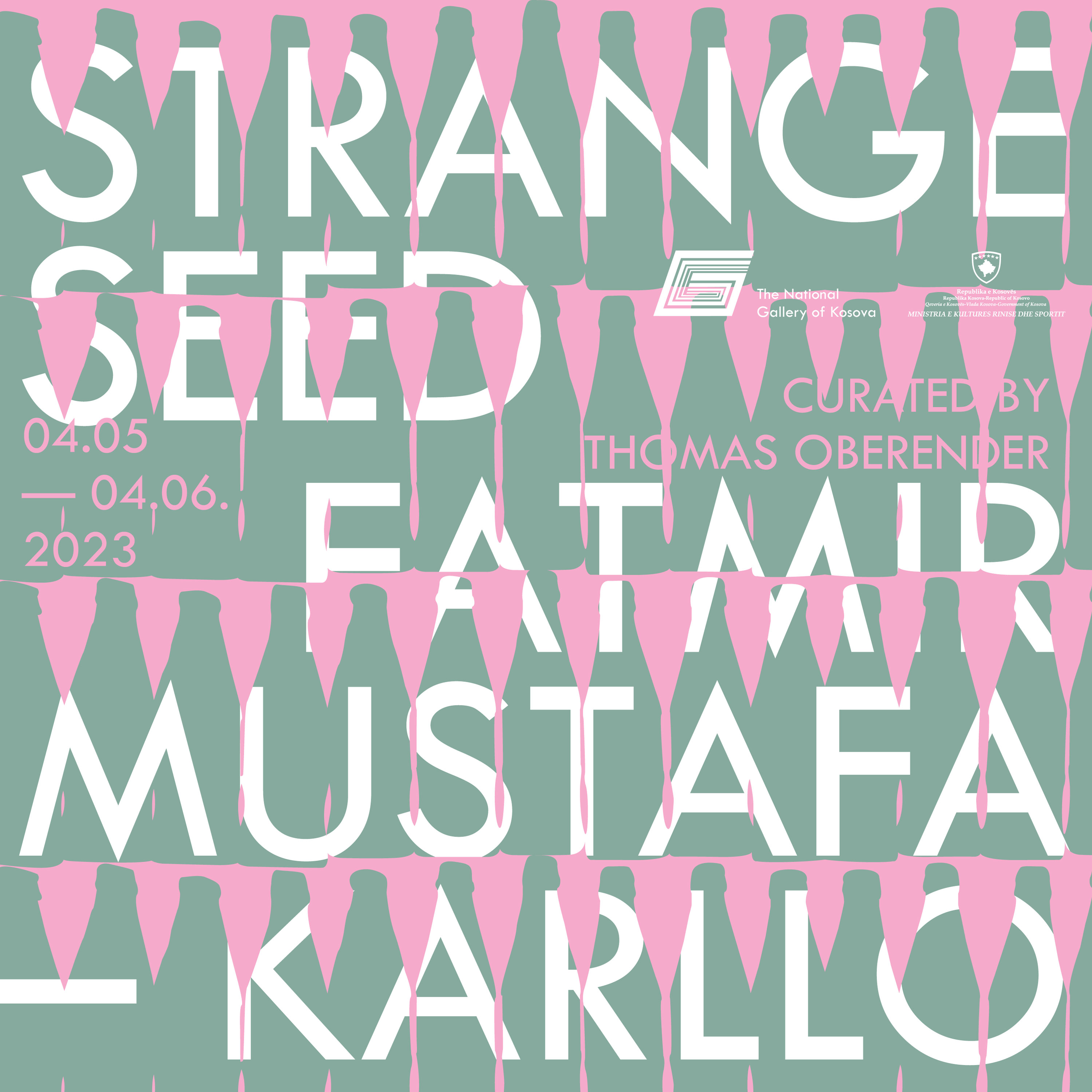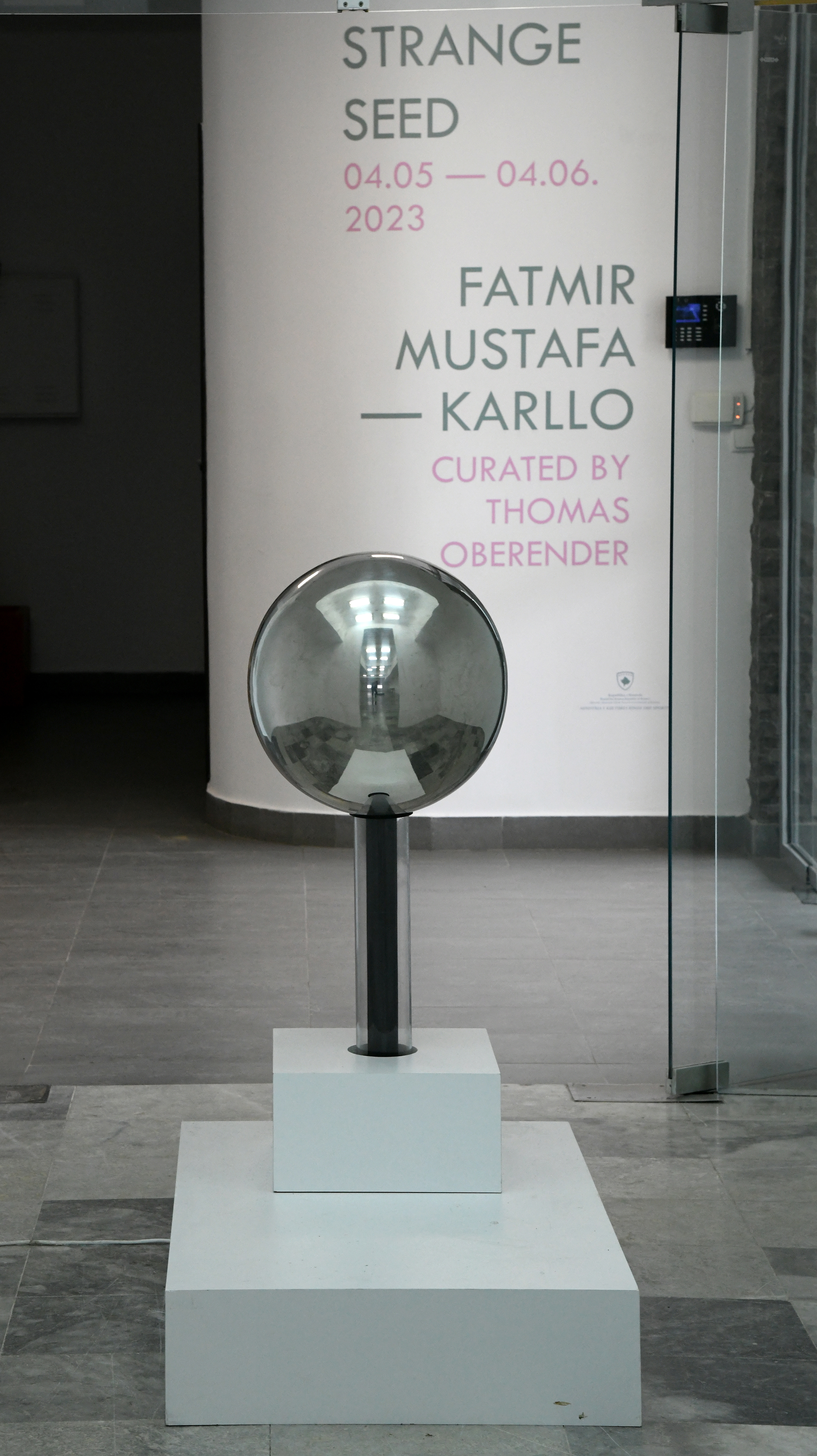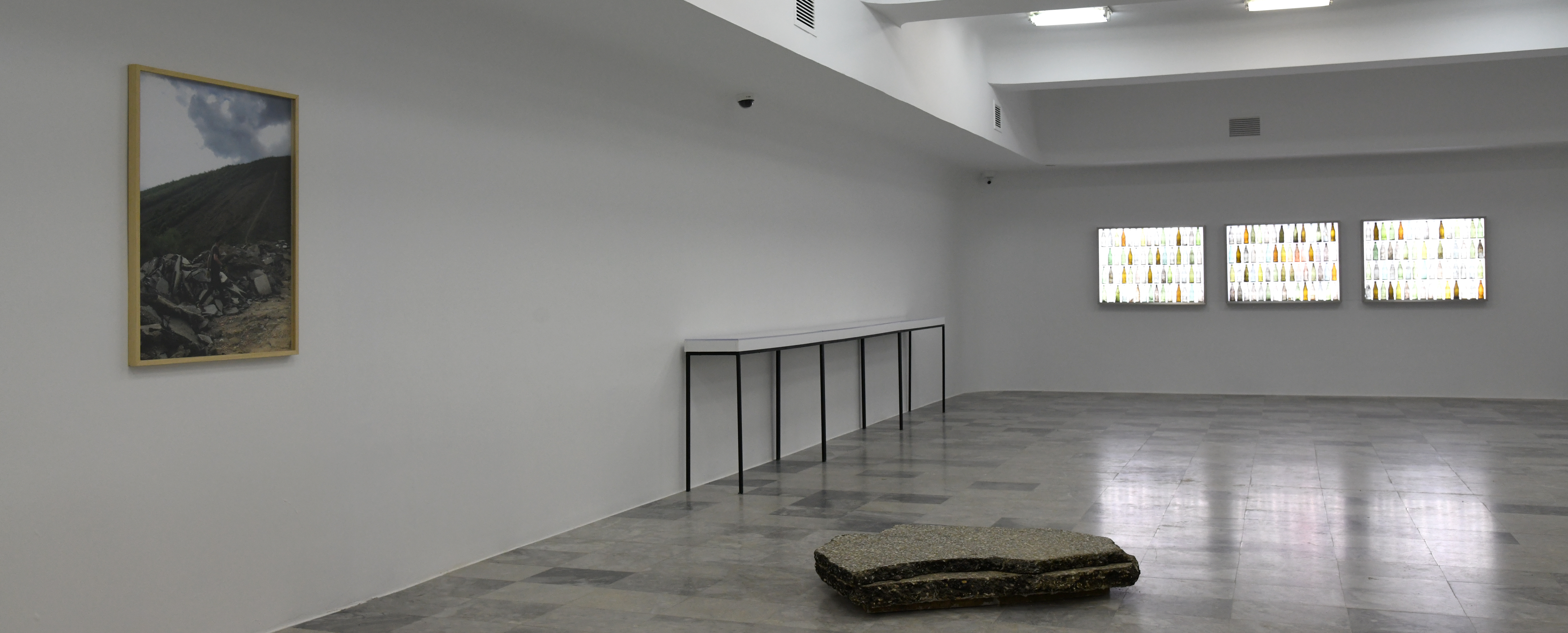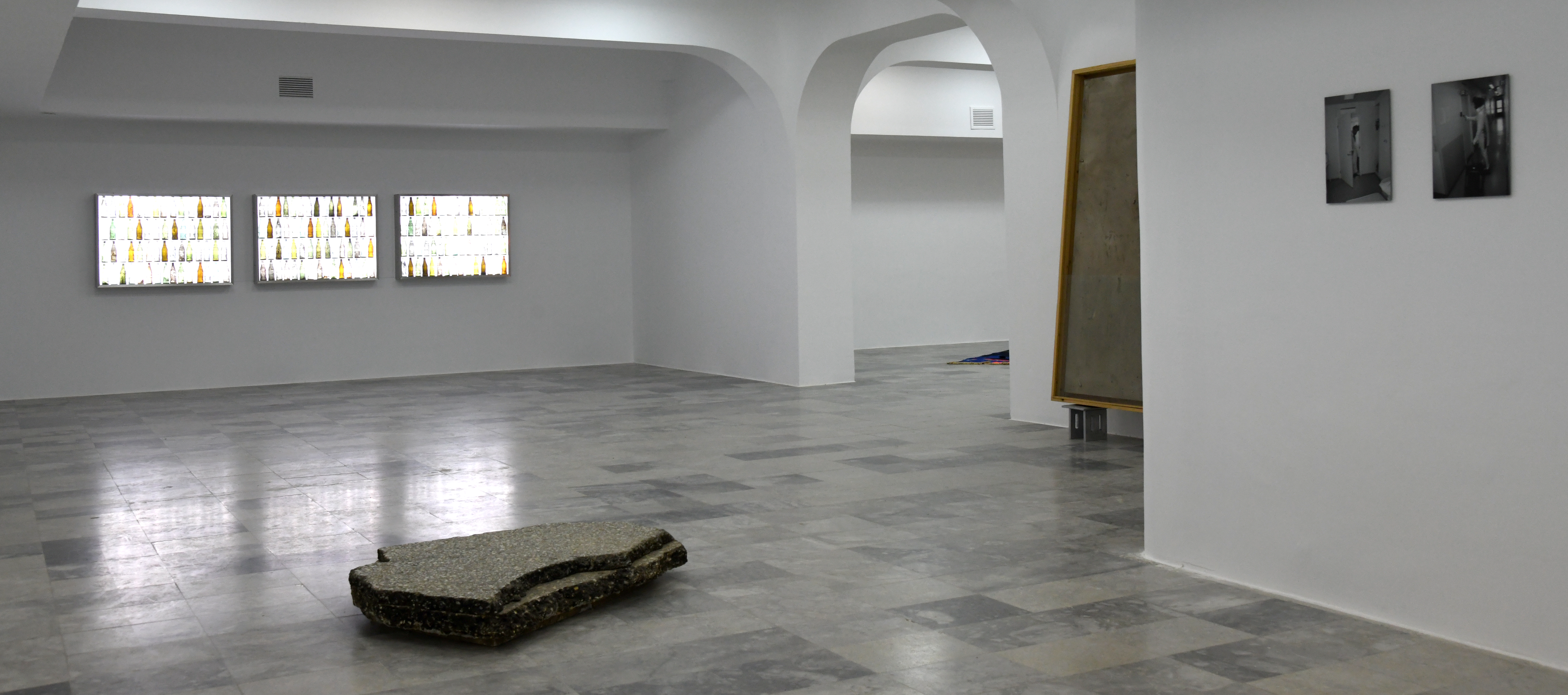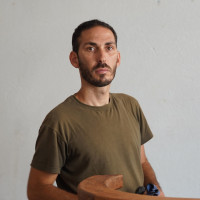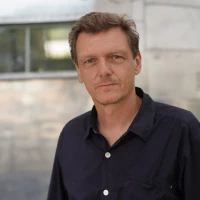Fatmir Mustafa-Karllo: Strange Seed
Activate objects. Activate memories. Activate alternative futures.
Fatmir Mustafa-Karllo's works are engaged, not in the sense of art as a projection screen for private experience, but as a witness inscribed in the material. For a good two decades, many of his works have been related to his performances and interventions, which reframe spaces and social processes and connect them with an alternative perspective. The works presented in the exhibition “Strange Seed” are situational, primarily in relation to concrete historical spaces and public places, from which the material used originates and to which it simultaneously refers. Protective work clothing, asphalt, historical documents - these are the strange seeds that the artist passes on through time and incorporates into his work as a rebellious and alternative form of memory.
Seeds are both things and the source of vital processes. As fruit, they are food, something that is produced and sold as an agricultural product. And at the same time, every seed is an image of pure potentiality, a latent source of development, growth, and life. Strange seeds are those fruits that are out of the ordinary or simply seem strange in their context. As an unexpected or unintentional deviation, they create a divergent view of the rule. The attention they attract de-normalizes reality and makes the overlooked visible.
Some of the objects shown in the exhibition originate from or document performative processes - the white sweat towels used by workers and laborers on the streets of Elbasan to dry themselves during their encounters with the artist, or the marble bust of the artist as Elvis Presley, referring to his 2011-2012 performance „Anyways, Always“ in a Finnish social station, documented in “Strange Seed” in several photo series.
The neon sculptures „It’s difficult“ and “You better stop it” are also linked to performances in which Karllo reflects on the situation of the artist and the relationship between art and the art market, including actions such as "Meet the Curator” (2007) or Karllo's installation “The accidents of Rose's” (2008) in the “Barber Shop'' project curated by Sislej Xhafa in Pristina. Here, the visitor sat in a barber's chair facing a mirror in front of which portraits of a prominent curator were suspended from the ceiling by threads. The sculpture “The Artist Must Stand”, which opens the exhibition “Strange Seed”, is also part of this complex of works.
A specific perceptual situation is also created in the exhibition by works such as the painting “Rapid Eye Movement”, whose glass surface, composed of various materials, reflects the viewers in the gallery in a fractured way. The white and dark rooms from the series “History of Misery”, in which visitors can discover the phosphorescent inscriptions of the prisoners with the light of their smartphones, also aim to create an unusual experience.
As in the sculpture „The Artist Must Stand“, many of Karllo's works are designed to draw the viewer into the space of the work, often leaving a sweet and sour experience: Can you walk on a carpet of work clothes? What is the scent of those airy white cloths in the large glass box?
Many of Karllo's works develop a sculptural concept of materials that are specific to the concrete places from which they come and to which they refer. In found objects such as asphalt slabs, historical documents, the dusty emptiness of former factory buildings, or the inscriptions of prisoners, the artist discovers the political processes and individual destinies they contain. Works such as the light boxes of the „Moon“ series or the asphalt images of the „Nightmare“ group bring the material into a serial form that abstracts the found object, crushing it into dust as in the “Rapid Eye Movement” series, transforming it into luminous panels of colour as in the “Moon” boxes, or processing the uniform individual pieces of various protective clothing into an abstract carpet as in “Seen”.
Simply beautiful in a pleasing sense Karllo's works are never, though they are vital and conceptually sophisticated. They conceal their narrative in ambiguous situations and signs, which in turn bring their materiality and history into the work and preserve it within it. In this sense, many of Karllo's works are related to the concept of the archive. They are a collection of specific objects that contain historical testimony, such as the letters of the workers in 'Moon' or the inscriptions of the prisoners in the series “The History of Misery”, and contribute to a late re-examination that points far beyond the concrete things.
Karllo's works are trouble spots where the experience of social upheaval, violence, and history can be experienced from the perspective of someone who questions the self-evidence or apparent lack of alternatives to these processes. Everywhere he sees this strange seed at work, unfolding unexpected effects over great temporal distances. Just as our present is sowing the seeds that will shape the lives of our children and future generations.
What will the consequences of our current way of doing business, of changing cities and landscapes, of making and breaking contracts be in a few decades or maybe even a few months? What does it mean for our togetherness, for the weak, for the vulnerable, for other forms of life?
The various works in this exhibition grow from the strange seeds of times gone by. The archiving of found objects, historical testimonies, and the use of ready-made objects is a strand in Fatmir's work, as are his performances and actions in public spaces, from which some of the objects shown in 'Strange Seed' have emerged. Their reality is transformed in the exhibition space but remains situational as it activates and invites the viewer to climb onto the pedestal of the monument.
Karllo describes itself as a strange seed. Seemingly unable to grow like any other sunflower in the field, it stretches its head in a different direction, looking at the world differently and absorbing unusual energies and nutrients from the soil. This position, on the one hand perverse, often resisting and provocative, is at the same time a gift because as a strange seed sticking out of the field, the artist finds an expression for the hidden reality under the mask. But of course, the artist is not the only strange seed - the exhibition shows that the world is full of strange seeds.
"Strange Seeds" is an exhibition about listening, triggered by the pleading letters of the Albanian workers to their superiors, by the inscriptions of the prisoners in Rankovic's dungeons, or by the mountains of rubble torn out of the asphalt - a time stored in the grey coating that suddenly lies before us in huge fragments. The exhibition shows the artist diving between the layers of asphalt, searching for life there, for himself and the strange seed that is real life as he sees it.
On the road from Pristina to Skopje, the city does not stop until it reaches the border. In some places, the road is buckling under the weight of the lorries, and whole sections of it are sliding down the hillside. Small shops line the road, shops selling everything needed for building sites and houses, workshops, apartment blocks, and gated communities for the rich, and rarely is there a patch of farmland. Where the road is torn up, stony earth appears. Near the Macedonian border, on a hill, there is a large UCK cemetery. It is surrounded by stone walls and corner towers, like a fortress. Behind it are former fields, now used to store stones, countless wrecked cars, sorted by carcass, interspersed with restaurants, hotels, massage parlours, and new houses with no occupants.
The few old buildings still have the occasional bullet hole from the war. But the destruction of peace prevails, even though every house, every hall, and every kiosk is a hope for a new life, a place for the family, a testimony to hard work, and a longing for security. Only twenty years ago, large fields of sunflowers lined the road. Progress itself is a strange seed. It germinates in ways that no one expected. The artist Fatmir Mustafa-Karllo has experienced war, displacement, loss of home and family, poverty in the rich West, and the new powers in the old East.
The cover of the exhibition shows the imprint of a hand on a white cotton cloth. Obviously, the hand that wiped the sweat from its body with this cloth was the hand of a manual worker. The two photographs at the front of the second room show one of these workers using cloth in the Albanian town of Elbasan. This cloth is the life that Fatmir Mustaffa-Karllo is passing on through time. Against the voice of discouragement that speaks brightly from the walls of the gallery in neon letters: "It's difficult. You better stop". Only art can hear in these sentences the incentive to do it anyway.
Thoughts are seeds. So are human actions or unexpected events that intervene in people's biographies and set them on new, often unexpected paths. These seeds often multiply in people and their thoughts over generations, and after a while, it is hard to tell where they came from, who brought them, and what became of them, because they have become too normal to be noticed. Unless, of course, you notice them, like the strange seeds that Mustafa-Karllo makes sprout in his exhibition.
Curatorial text by Thomas Oberender.
